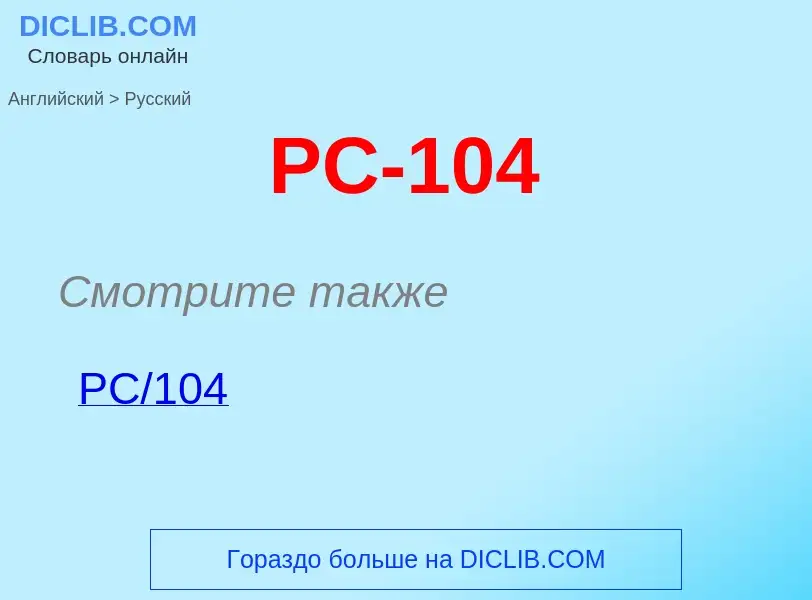Vertaling en analyse van woorden door kunstmatige intelligentie ChatGPT
Op deze pagina kunt u een gedetailleerde analyse krijgen van een woord of zin, geproduceerd met behulp van de beste kunstmatige intelligentietechnologie tot nu toe:
- hoe het woord wordt gebruikt
- gebruiksfrequentie
- het wordt vaker gebruikt in mondelinge of schriftelijke toespraken
- opties voor woordvertaling
- Gebruiksvoorbeelden (meerdere zinnen met vertaling)
- etymologie
PC-104 - vertaling naar Engels
Смотрите также
общая лексика
стандарт PC/104
стандарт на промышленные PC (IEEE-P996.1) для жестких условий эксплуатации. Задаёт размеры модуля 90x96 мм и способ их компактного этажерочного соединения с межмодульным расстоянием 1,5 дюйма. Для соединения модулей применяются 64- и 40-контактные позолоченные штыревые разъёмы. Продвижением этого стандарта занимается одноимённый консорциум
синоним
Смотрите также
общая лексика
HPC
карманный компьютер
компьютер, на котором исполняется операционная система Windows CE
антоним
Definitie
Wikipedia
PC/104 (or PC104) is a family of embedded computer standards which define both form factors and computer buses by the PC/104 Consortium. Its name derives from the 104 pins on the interboard connector (ISA) in the original PC/104 specification and has been retained in subsequent revisions, despite changes to connectors. PC/104 is intended for specialized environments where a small, rugged computer system is required. The standard is modular, and allows consumers to stack together boards from a variety of COTS manufacturers to produce a customized embedded system.
The original PC/104 form factor is somewhat smaller than a desktop PC motherboard at 3.550 × 3.775 inches (90 × 96 mm). Unlike other popular computer form factors such as ATX, which rely on a motherboard or backplane, PC/104 boards are stacked on top of each other like building blocks. The PC/104 specification defines four mounting holes at the corners of each module, which allow the boards to be fastened to each other using standoffs. The stackable bus connectors and use of standoffs provides a more rugged mounting than slot boards found in desktop PCs. The compact board size further contributes to the ruggedness of the form factor by reducing the possibility of PCB flexing under shock and vibration.
A typical PC/104 system (commonly referred to as a "stack") will include a CPU board, power supply board, and one or more peripheral boards, such as a data acquisition module, GPS receiver, or Wireless LAN controller. A wide array of peripheral boards are available from various vendors. Users may design a stack that incorporates boards from multiple vendors. The overall height, weight, and power consumption of the stack can vary depending on the number of boards that are used.
PC/104 is sometimes referred to as a "stackable PC", as most of the architecture derives from the desktop PC. The majority of PC/104 CPU boards are x86 compatible and include standard PC interfaces such as Serial Ports, USB, Ethernet, and VGA. A x86 PC/104 system is usually capable of standard PC operating system such as DOS, Windows, or Linux. However, it is also quite common to use a real-time operating system, such as VxWorks.



